Ministry of Textiles
Ministry of Textiles celebrates ‘World Cotton Day’ 2025
Government aims not only to expand exports and textile markets but also to achieve carbon neutrality by 2030: Shri Giriraj Singh
Kasturi Cotton Bharat will be India’s pride — a symbol of purity, quality, and sustainability: Union Minister
Industry signs several Memorandum of Understandings to promote Indian Kasturi Cotton Brand
Posted On:
07 OCT 2025 8:47PM by PIB Delhi
The Union Minister of Textiles, Shri Giriraj Singh and Union Minister of State for Textiles and External Affairs Shri Pabitra Margherita attended the celebration of World Cotton Day 2025 at New Delhi. The event was jointly organized by the Ministry of Textiles and Confederation of Indian Textile Industry (CITI) focusing on the theme “Cotton 2040: Technology, Climate & Competitiveness.”
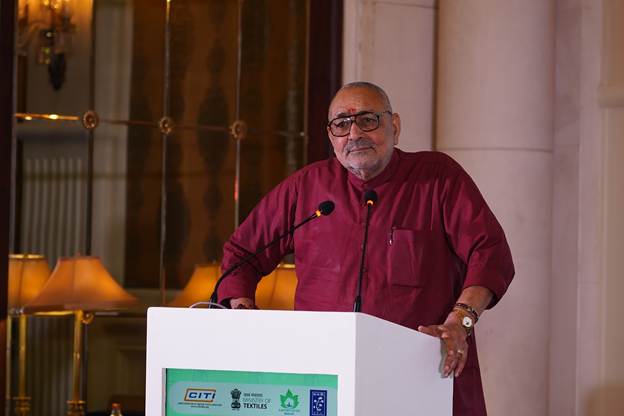
While addressing the gathering, the Union Minister reiterated the Government’s commitment not only to achieving the USD 350 billion textile sector target by 2030, including USD 100 billion in exports, but also to moving towards carbon neutrality. He stressed that cotton is not merely a crop — it is the very soul of Indian agriculture, a reflection of the farmer’s sweat, resilience, and hope. He conveyed his wishes to cotton farmers on World Cotton Day as each thread of cotton carries the story of our farmers — of their hard work under the scorching sun, their prayers for rain, and their unwavering faith in the soil,”
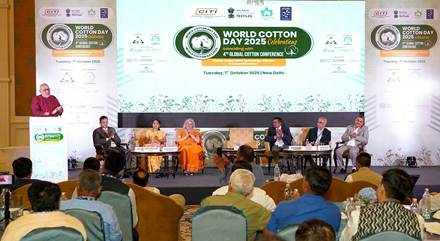
The Union Minister noted that climate change and environmental sustainability pose major challenges to the sector. He emphasized that the climate is changing, and we must use water and electricity judiciously and work together to protect nature. Efficient water use, soil conservation, and adoption of renewable energy are vital to protect India’s predominantly rain-fed cotton regions and to ensure that the hard work of farmers leads to prosperity for generations to come.
Shri Giriraj Singh stressed that this transformation can only happen when every stakeholder—from farmers to textile exporters—works as one family. Although India accounts for 40% of the world’s cotton area, productivity remains around 450 kg per hectare, much lower than 2,000 kgs per hectare in many other countries. The Mission for Cotton Productivity, under active consideration, aims to address this gap. He also said that the increase in Minimum Support Prices (MSP) over the last decade has demonstrated the Government’s commitment to the cause of farmer welfare.
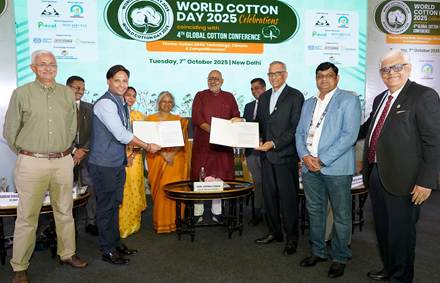
Highlighting the future potential of natural fibres like milkweed, ramie, and flax, he said that India’s farmers have the strength and wisdom to lead the world in sustainable fibre production. “The world is moving towards eco-friendly products, and our farmers can show the path ahead,” he added.
In a heartfelt appeal, the Minister called upon all stakeholders —ginners, spinners, brands, and exporters — to connect emotionally with the farmers who make the cotton journey possible. Let us make Kasturi Cotton Bharat the pride of every Indian — a cotton that the world recognizes for its purity, quality, and sustainability, just as it does Egyptian Giza or American Supima.
During the opening session, Shri Pabitra Margherita said India must strive to attain a leadership position in quality, sustainability, and ethical production. The Kasturi Cotton initiative has the potential to contribute immensely to the ‘5F’ (farm-fibre-factory-fashion-foreign) vision of the Government, he pointed out. He added that India and Russia could forge deeper ties in the textiles and apparel arena.
Ms Neelam Shami Rao, Secretary Textiles in her address mentioned that World Cotton Day celebrates cotton’s enduring link with livelihoods, sustainability, and innovation. She highlighted that the cotton sector supports six million farmers and provides employment to over 45 million people across the value chain.
She emphasized that the future of Indian cotton lies in technology-led transformation — from advanced cotton breeding and precision farming to digital traceability, data-driven extension services, and modernization of ginning infrastructure. These innovations, she noted, are vital to enhancing productivity, quality, and sustainability.
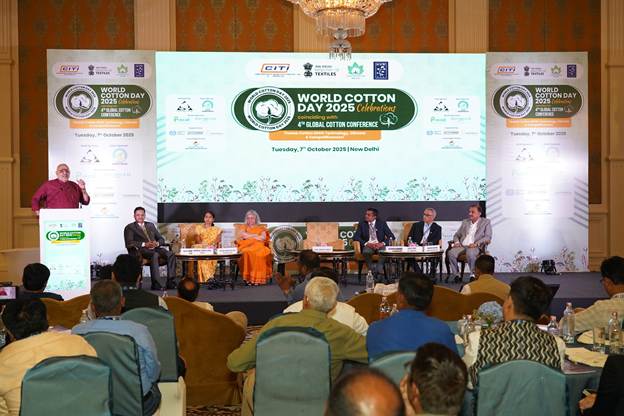
She urged all stakeholders to adopt a collaborative and technology-integrated approach to address the productivity challenges of the cotton sector. She also underlined the importance of sustainability certifications, quality assurance, and value addition to position Kasturi Cotton Bharat as a globally recognized symbol of purity, quality, and technological excellence. She also urged CITI CDRA to reach more farmers to undertake the High Density Planting System (HDPS).
Dr. M Beena Development Commissioner (Handlooms) & Textile Commissioner reiterated that a focus on technology and innovation is the need of the hour and the Ministry of Textiles is continuously supporting the industry through schemes such as ATUFS, PM MITRA, NTTM etc.
Smt. Padmini Singla, Joint Secretary, Ministry of Textiles, in her keynote address, emphasized that enhancing sustainability is paramount, and the Ministry has been encouraging a collaborative approach to address the challenges faced by the textile industry. She highlighted the inter-ministerial coordination in launching a holistic plan Mission for Cotton productivity aimed at increasing cotton production and yield, thereby enabling farmers to enhance their income.
She stressed that the collective mission must be to enhance productivity, ensure quality and transparency, and build trust through traceable and sustainable cotton practices. In the global market, she added, labelling, contamination control, and traceability are emerging as non-negotiable trade parameters. Through strategic policies, scientific advancements, and strong industry partnerships, India can regain its leadership in high-quality cotton production, promote climate-smart and sustainable practices, and build a globally recognized brand for trusted, traceable, and premium Indian cotton.
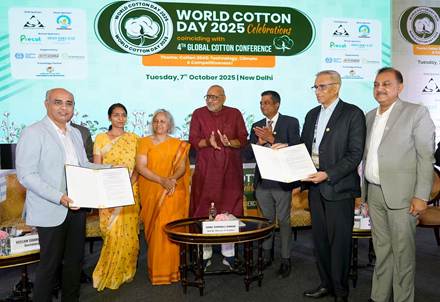
This World Cotton Day 2025 celebration event also witnessed valuable insights from Shri Lalit Kumar Gupta, Chairman-cum-Managing Director of CCI, on the Corporation’s contribution towards empowering cotton farmers of the country through various initiatives and digital transformation.
Shri Ashwin Chandran, Chairman, CITI, and Shri Ravi Sam, Vice Chairman, TEXPROCIL focusing on the importance of cotton and textile industry in driving economic growth, employment generation, and providing livelihood to farmers, women empowerment.
The programme concluded with the signing of Commercial, Community and Council MoUs under the Kasturi Cotton Bharat initiative with renowned organizations like Nitin Spinners, Arvind Ltd, RSR International, All India Cotton FPO Association (AIFCA), Beetle Regen, Hohenstein, ICAR-CIRCOT and Noida Apparel Export Cluster (NAEC).
Various other eminent speakers shared their valuable insights during the occasion.
***
MAM/AK/SMP
(Release ID: 2176028)
Visitor Counter : 4322